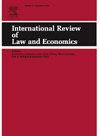Jury priors and observable defendant characteristics
IF 1
3区 社会学
Q3 ECONOMICS
引用次数: 0
Abstract
Although prohibited, jurors sometimes condition, consciously or subconsciously, their belief that a defendant is guilty on the defendant’s race or ethnicity or other observable characteristics. This can be viewed as a juror forming a prior or pre-trial/evidence disclosure belief of guilt. In doing this, they rely on their perceptions of education, socio-economic status, religion, beliefs, networks, etc. for the defendant’s race (or other observable characteristic) and how they perceive those to influence the probability the defendant is guilty. This is consistent with aversive discrimination, which suggests that people want to be egalitarian and not condition on race but have a tendency to base decisions on factors that are discriminatory when race is not salient. When this prior or pre-trial/evidence disclosure belief of guilt overestimates the prior probability of guilt for those in the minority group, it underestimates the prior probability of guilt for those in the majority group. Prohibiting conditioning on observable defendant characteristics can be viewed as requiring the use of the population prior/pre-trial probability of guilt. Conditions for when such prohibition improves accuracy are provided. While it is difficult to effectively prohibit this, studies of aversive discrimination suggest that making race salient in a trial can reduce implicit bias on race. So these results may provide some guidance on when such activity should be permitted.
陪审团先验和可观察的被告特征
虽然被禁止,但陪审员有时会有意识或潜意识地以被告的种族或其他可观察到的特征来决定他们对被告有罪的信念。这可以被视为陪审员形成事先或审前/证据披露的有罪信念。在这样做的过程中,他们依靠他们对被告种族(或其他可观察到的特征)的教育、社会经济地位、宗教、信仰、网络等的看法,以及他们如何看待这些因素来影响被告有罪的可能性。这与厌恶歧视是一致的,这表明人们想要平等,不以种族为条件,但当种族不突出时,人们倾向于基于歧视性因素做出决定。当这种先前或审判前/证据披露的有罪信念高估了少数群体的有罪先验概率时,它低估了多数群体的有罪先验概率。禁止对可观察到的被告特征施加条件可以被视为要求使用人口在先/审前有罪概率。提供了这种禁止何时提高准确性的条件。虽然很难有效地禁止这种情况,但对厌恶歧视的研究表明,在试验中突出种族可以减少对种族的隐性偏见。因此,这些结果可能为何时允许此类活动提供一些指导。
本文章由计算机程序翻译,如有差异,请以英文原文为准。
求助全文
约1分钟内获得全文
求助全文
来源期刊
CiteScore
2.60
自引率
18.20%
发文量
38
审稿时长
48 days
期刊介绍:
The International Review of Law and Economics provides a forum for interdisciplinary research at the interface of law and economics. IRLE is international in scope and audience and particularly welcomes both theoretical and empirical papers on comparative law and economics, globalization and legal harmonization, and the endogenous emergence of legal institutions, in addition to more traditional legal topics.

 求助内容:
求助内容: 应助结果提醒方式:
应助结果提醒方式:


